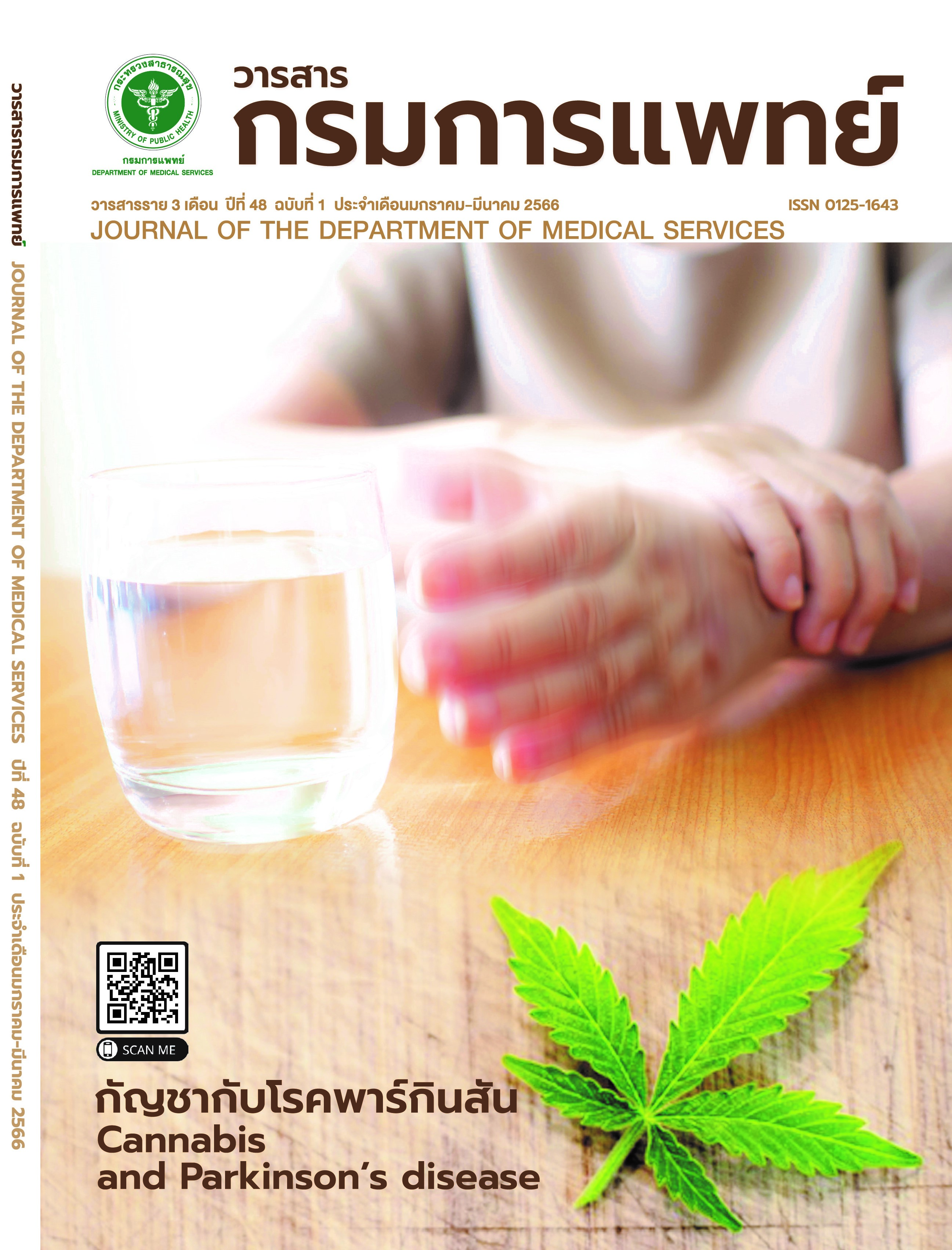Determination of Proper Blood Supply in COVID-19 Pandemic for the National Cancer Institute
Keywords:
Blood supply, Blood inventory level, Management in blood bankingAbstract
Background: During the COVID-19 pandemic, fewer regular blood donors have precipitated blood shortagesupply to the blood bank unit of the National Cancer Institute (NCI). Objective: To assess blood supply and bloodcomponents utilization of NCI during the COVID-19 pandemic and to identify, based on the assessment, the contingencyplan and policy on efficiently maintaining adequate blood supply for cancer patients in time of blood shortage crisisduring the COVID-19 pandemic. Methods: The retrospective data of NCI’s blood supply and blood componentsutilization by each blood type, including A, B, and O, were collected from January to December 2021 (1 year period).The average daily usage was calculated in order to estimate the required units of blood and blood products, whichincluded a stock of red cells products and fresh frozen plasma (FFP) for seven days of usage, platelet supply forthree-day use, and cryoprecipitate supply for one-year use. An additional 10 percent of each blood product werealso calculated for emergency needs. Results: The study revealed that blood products that were commonly usedwere 4,862 units of red blood cells, 4,428 units of FFP, 430 units of platelets, 240 units of cryoprecipitate, andRh negative 10 units, respectively. The findings also recommended that in the blood bank, the required stocks ofblood units and blood components of group A, B, O, and AB were as followed: 34, 43, 48, and 20 units of red bloodcells; 43, 55, 55, and 25 units of FFP; 8, 7, 7 and 5 units of platelets; and 50 units of cryoprecipitate. Conclusion: The recommended level of blood component inventory from this study was considered the appropriate amountof blood storage that the blood bank unit of NCI should maintain to ensure adequate blood supply in both normaland crisis situation, particularly during the COVID-19 pandemic, that caused insufficient blood supply in the institute.
References
Aiemtago P. Blood management in The National Blood Center,Thai Red Cross Society [Dissertation]. Nakorn Prathom: SilpakornUniversity; 2013.
Chanettemahan U, Kerdkaewngam K. Coronavirus disease 2019(COVID-19) and blood transfusion service. J Hematol TransfusMed 2021; 31:93-101.
Ratchak P. Impact of COVID-19 in blood transfusion service of the6 Andaman provinces. J Hematol Transfus Med 2021; 31:377-83.
Blood reserves were reduced by more than half! Korat Red Crossrushes to request blood donations to help patients during theCovid-19 epidemic. [Internet]. 2022 [cited 2022 May 7]. Availablefrom: https://www.matichon.co.th/region/news_2697127
Lertpaisankul S, Phomsila R, Thipsuwankul W, Phetsree N,Rodwihokand T, Tadsomboon S. Model of blood recruitmentand impact of blood management of the six lower-northernprovinces during the COVID-19 pandemic in 2020. J HematolTransfus Med 2021; 31:35-45.
Invite Thai people to donate blood, 20 percentages through theimpact of Covid-19. [Internet]. 2022 [cited 2022 May 7]. Availablefrom: https://www.thaihealth.or.th/Content/54562-
Rabinowitz M. Blood bank inventory policies: a computersimulation. Health Serv Res. 1973; 8:271-82.
Trakulkaseamsir S. An adequate blood supply for QueenSawangvadhana Memorial Hospital, Thai Red Cross Society.J Assoc Med Sci 2011; 44:99-105.
Daroonchu S, Prawannay S, Duangphoommes N. A model studyof determination of prper blood supply for the National InstituteCancer. Thai Cancer J 2008; 28:64-73.
Permpikul P, Outrakoolpoonsuk K, Jaiyen B, Pisuttiporn S,Chongkolwatana V. Determination of proper blood supply forSiriraj Hospital. J Hematol Transfus Med 2007; 17:115-22.
Sorosalikit W, Jainan S. Study of proper blood supply for PhraeHospital. J of Phrae Hospital 2011; 19:52-63.
Wisetwut P, Laisuphasin P, Duangpummet N, Thompat W.Distribution of ABO blood groups among clients receivingannual checkup at National Cancer Institute. Chest Dis Inst J2015; 13:29-34.
Downloads
Published
How to Cite
Issue
Section
License
Copyright (c) 2023 Department of Medical Services, Ministry of Public Health

This work is licensed under a Creative Commons Attribution-NonCommercial-NoDerivatives 4.0 International License.
บทความที่ได้รับการตีพิมพ์เป็นลิขสิทธิ์ของกรมการแพทย์ กระทรวงสาธารณสุข
ข้อความและข้อคิดเห็นต่างๆ เป็นของผู้เขียนบทความ ไม่ใช่ความเห็นของกองบรรณาธิการหรือของวารสารกรมการแพทย์



